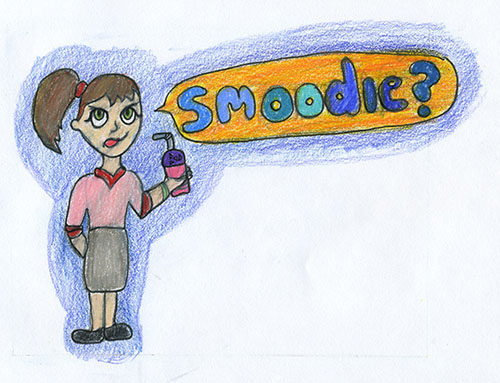An Indian mom is teaching her daughter how to cook her famous pork chop dish. To describe the steps, she explains what to do first, second, and third, but it comes out as “firs”, “seconth” and “thirf”. Her daughter laughs, and the mom laughs along although hurt on the inside.
She’s from India, or a busy mom working night shifts while juggling a packed schedule. Despite knowing very little about a stranger’s story, our society tends to unjustly correlate mispronunciations with a lower intelligence or laziness.
When I was a freshman, I had this uncanny obsession with smoothies. It was smoothies for breakfast, lunch and dinner. I ordered a smoothie wherever I went, but I have a problem.
I can’t pronounce the word “smoothie.” In fact, I can’t pronounce any words with th’s–Earth comes out as “earf”; brother as “brudder”; others as “udders”, and smoothies as “smoodies”.
“Ah, she must be fresh off the boat.” I would hear someone would say behind my back. “Why can’t she learn how to speak English properly?”
In middle school, a new Chinese girl joined our class and introduced herself in broken English. She talked slowly and mispronounced every third word. The teacher then bent down and replied to her in a slow, agonizing manner. “Wel-come! This is ENGLISH. How are YOU.” To the teacher, the girl was just starting kindergarten despite being an eighth grader.
If you can’t pronounce an English word correctly, you must be new to the states or simply too busy to learn proper English. More than once, we group such mispronunciation in with stupidity and ignorance. You’re a foreigner that didn’t take English Second Language classes? Why would you do that to yourself?
But is it really right to make such assumptions?
The reality is that we assume the wrong things all the time. Because a person walked out of a class mad, we assume that the class must be frustrating, but the person was actually mad because he would have to take the bus home that night. In the same way, we cannot assume that mispronunciation defines intelligence or work ethic.
The Indian mom may not be very fluent in English, but she can speak a whole different language in complete confidence. I might not be able to pronounce my th’s correctly, but I can deliver speeches, hold conversations, and write just as well as you can. And the girl from China was actually a genius mathematician who stunned us with her expertise in numbers and formulas.
Making assumptions is all too common in society, but indicators like the mispronunciation of words should not be used to create an overarching assumption. The inability to correctly pronounce a word should not translate into stupidity, laziness or being unskilled. After all, what someone says should be more important than how they say it.














